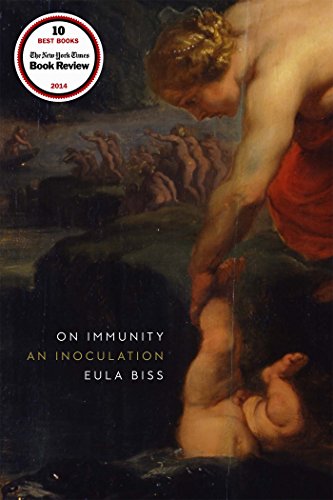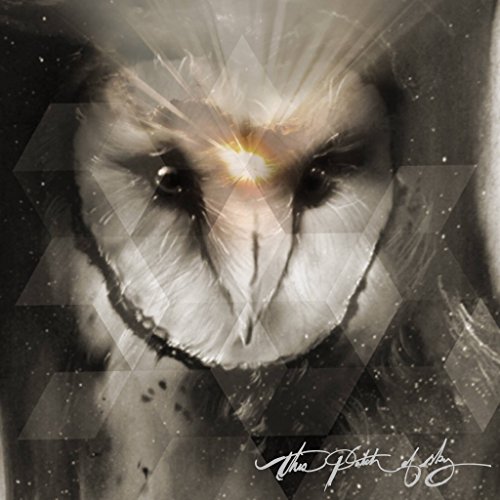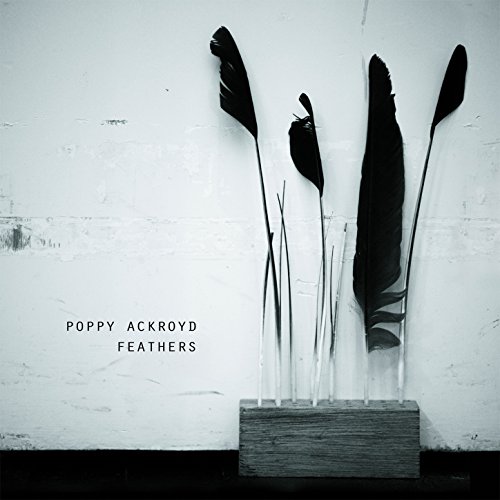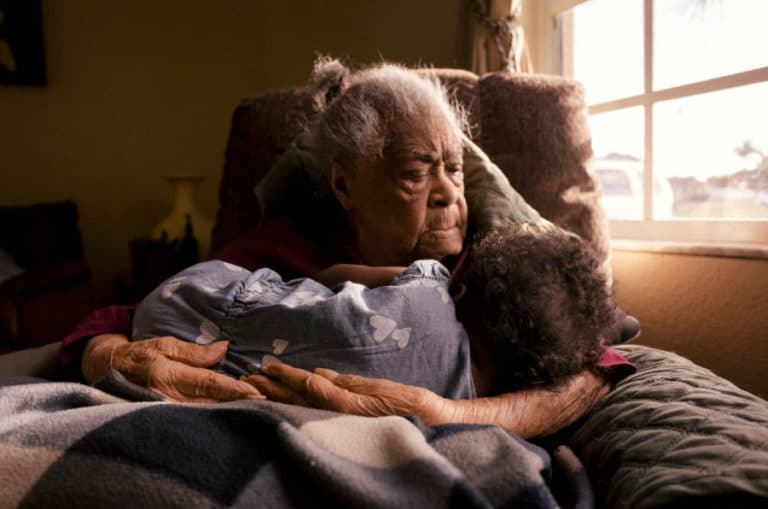Eula Biss
Talking About Whiteness
You can’t think about something if you can’t talk about it, says Eula Biss. The writer helpfully opens up lived words and ideas like complacence, guilt, and opportunity hoarding for an urgent reckoning with whiteness. This conversation was inspired by her 2015 essay in The New York Times, “White Debt.”

Image by Ann Hamilton, © All Rights Reserved.
Guest
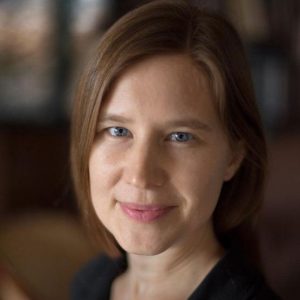
Eula Biss teaches writing at Northwestern University. Her books include On Immunity: An Inoculation and Notes from No Man's Land: American Essays. This conversation was inspired by her New York Times essay “White Debt.”
Transcript
This episode originally aired on January 19, 2017.
Krista Tippett, host: Eula Biss authored an important essay in 2015 called “White Debt.” She reflected on whiteness in America through the metaphor of buying a house — how surprisingly comfortable debt can be in the right circumstances, and how easily we forget that we don’t actually own what we feel we possess. She helpfully opens up words and ideas like “complacence,” “guilt,” and something related to privilege called “opportunity hoarding.” This show has been turned to by many in this moment and so we are offering it up anew. It is the only on-air conversation I’ve ever had in which my guest and I had to stop midway and acknowledge how embarrassing it is that we have to have this conversation at all, and how inadequate all of our words. Yet how urgent that we reach for them nevertheless. Rereading the essay that introduced me to her, I’m struck by sentences that have now revealed their deepest, hardest truths in my community in Minneapolis and across our nation. She wrote:
“Whiteness is costing me my community. It is the wedge driven between me and my neighbors, between me and other mothers, between me and other workers. Like a bad loan, the kind in which the payments increase over time, the price of whiteness remains hidden behind its promises.”
I’m Krista Tippett, and this is On Being
Tippett: And about how we live together as opposed to just how we talk together.
Biss: Yeah. I think if you can’t talk about something, you can’t think about something. I’ve worked with students who could barely let themselves think, they were so scared of thinking the wrong thing.
Tippett: I’m Krista Tippett, and this is On Being.
[music: “Seven League Boots” by Zoe Keating]
Eula Biss teaches writing at Northwestern University and is best known for her book On Immunity. She’s also the author of Notes From No Man’s Land, which deals in part with her experience growing up in a multiracial family. We spoke in 2016.
Tippett: I really want to frame our conversation around ideas that you pulled together so compellingly in this article you wrote in The New York Times in December 2015 called “White Debt: Reckoning with what is owed — and what can never be repaid — for racial privilege.”
I realized, as I read that you’ve actually been living and thinking around this subject for a long time. And in fact, as you wrote in your Notes from No Man’s Land, it very much centers around themes of race, and you actually have, in your family, a cousin who’s of mixed race. There are mixed race adoptions in your family. In fact, most of our families, if we traced them fully, we would probably find this. But your mother’s long-time boyfriend when you were a teenager was African American.
Biss: I do try to resist the idea that there’s something unique or special about the kind of racial makeup of my family because I feel like that supports this idea that only people who are racially other have an entryway into race. I guess that’s my preamble to the answer.
And the answer is that I think you’re right. I think most American families are in one way or another somewhat racially complicated. Mine was maybe especially so. My household when I was growing up was mixed. My stepsister was black, my stepfather was black. So I was exposed to people from a lot of different backgrounds, but I don’t think that that is, in America, all that unusual either.
Tippett: One thing I love about this article you wrote and about your writing in general is that you interrogate words, individual words, language that always appears in this conversation that we don’t really know how to have — interrogating language as a way of searching for a better understanding so that “whiteness” is there. One of the other words that you take apart — you say that the word “complacence,” as you looked at the roots of that word, the etymology of that word, that in fact it did not mean what you expected it to mean, and that also is a way to reflect on this.
Biss: I was looking for a word that would describe a kind of blindness that wasn’t even willful. When I looked at the meaning of the word “complacent,” it actually looked more intentional than the meaning I was searching for. Because I think that that’s part of the problem is the attitude is highly unintentional. It’s highly unexamined. It’s relaxing into your own privilege without even thinking about it. And that, again, is one of the privileges of being white, is that you can coast through your experience, you can coast through your life without having to think about what your race means to other people, and what your existence in a community means to the people around you.
Tippett: You cite this essay by Claudia Rankine that she wrote in The New York Times Magazine after the massacre in the church in Charleston. She wrote, “I asked another friend what it’s like being the mother of a black son. ‘The condition of black life is mourning,’ she said bluntly. For her, mourning lived in real time inside her and her son’s reality. At any moment, she might lose her reason for living. Though the white liberal imagination likes to feel temporarily bad about black suffering, there really is no mode of empathy that can replicate the daily strain of knowing that as a black person you can be killed for simply being black: no hands in your pockets, no playing music, no sudden movements, no driving your car, no walking at night, no walking in the day, no turning onto this street, no entering this building, no standing your ground, no standing here, no standing there, no talking back, no playing with toy guns, no living while black.”
And you wrote, “Sitting with her essay in front of me, I asked myself what the condition of white life might be.” I know that word “complacence” is something that you reflected on, but I wonder how would you think about that question right now, what the condition of white life might be, how to start to summarize that or to evoke that.
Biss: Well, I guess my mind, it goes right to the particulars. That moment that you read made me think of a meeting that I was recently in at my son’s elementary school, I think, because of Claudia’s friend talking about her son, and the question of how to keep him safe. I was at a meeting that was parents discussing how we were going to bring the issue of talking about race to the school community. And there was a huge range of experience in this room. There were parents who had not talked to their children about race at all, and there were parents for whom it was a daily concern.
There was a Kenyan woman there who was saying that the way her children looked every day had everything to do with how dangerous she understood it to be black in America. She talked about the way she dressed her two children and the way she taught them to talk to strangers and the way she taught them to act in public. And I was thinking about how few of those concerns I had shared, especially around safety. I haven’t spent time training my son in ways of being polite, for instance, because I’m afraid that someone will kill him. That doesn’t directly answer your question, but it points back towards the state of white life, or the state we’re in.
Tippett: Yeah. I live in a placid, kind of high-functioning, Leave It to Beaver neighborhood in St. Paul, Minnesota, the kind of neighborhood where you can — I moved here because your kids can get on their bicycle on a Saturday morning and not come back until dinnertime. You don’t ever worry about them. But right around the corner from my house, five blocks from my house, Philando Castile was shot. But the fact that we have to talk about this with our kids, because somehow, even though we are inhabiting our cities together, we’re not having the same experience. It’s very complicated and disturbing when you start to look at it that way.
Biss: It is. It really is. And an article came out in Bloomberg News that was making the rounds of conversation in my neighborhood. It was an article about Evanston Township High School, which is the high school that serves everyone in Evanston. So it’s necessarily a highly integrated high school. And a series of studies, one of them done at Stanford and another done within the Evanston school districts, found that in these integrated schools that we have in Evanston, black students and white students are not getting the same education.
This is even within the same buildings, with the same teachers, within the same physical space. And it’s still unclear exactly what the nature of the problem is, but one of the phrases that came up in this article, one of the researchers used a phrase “opportunity hoarding.” They use this phrase to describe what white parents do to make sure that their children are getting more than other children are getting.
And I really thought about both the opportunity hoarding that I had seen around me and the opportunity hoarding that I, myself, had engaged in. One example of opportunity hoarding that I’m just remembering from this article was that, for instance, something a little over 90 percent of white students at Evanston Township High School have taken at least one advanced placement class. And the numbers for African-American students are around 50 percent. There’s many more white students, a disproportionate amount of white students ending up in advanced placement classes.
There are probably a lot of factors that feed into that. There’s parent advocacy, there’s probably some racial bias going on on the part of the school, there’s probably dozens of different factors. But I think the reason that that term “opportunity hoarding” spoke to me is I thought, well, that’s something I can control for. Like, that’s something I can watch in my own behavior. That’s something that I could have conversations with my neighbors around, and how we’re treating the opportunities that are available to our children, and whether we’re ensuring that those opportunities are available to all the children in our community.
Tippett: And don’t you think, also — I mean, that’s a kind of an unsettling phrase, “opportunity hoarding.”
Biss: Yeah. Oh, deeply.
Tippett: But it also when it comes to our children, there’s such a fierce drive that we have to give them the best, to make things possible for them. It’s not, I think, consciously about wanting them to flourish at the expense of someone else. But what you’re pointing out and what that language makes clear is that in fact, that is what happens. Maybe I’m wrong that it’s always unconscious.
Biss: Yeah, and especially when we’re talking about limited resources, if those limited resources are hoarded, it necessarily means somebody isn’t getting them. This thinking got refreshed for me when I bought a house here in Evanston. Buying a house and getting a mortgage inspired me to do a little bit of research into housing laws and the history of redlining in my community and the history of housing discrimination and mortgage discrimination in Chicago.
Ta-Nehisi Coates has written really beautifully about this, especially in his piece, “The Case For Reparations.” He very elegantly lays out a history of legalized housing discrimination. Some of his examples, his particulars, come from Chicago. And when you look at that history, you can see a highly-intentional and entirely legal history of white people hoarding both real estate and financial resources like mortgages at the expense of other people.
Even in the case of predatory lending, there are people making money at the expense of African-American families who lose their houses because of the unfair loans that they’ve been given, the poor terms of lending. Buying a house was another moment where I felt that I was kind of forced to reflect on how I was benefiting personally from a long history of racist policies in my country.
[music: “The Winter Day Declining” by This Patch of Sky]
Tippett: I’m Krista Tippett, and this is On Being. Today, I’m with the writer Eula Biss, and we’re talking about whiteness.
Tippett: I was just speaking with Isabel Wilkerson, who wrote The Warmth of Other Suns, and very much to that point, she talks about when there was this exodus of 6 million African Americans in the 20th century from the South to the North. They could only live in certain places, and those certain places turn out to now be our inner cities and were charged exorbitant rates because they had no choice. That is in the DNA of our cities, you’re right. The buying of the house was the image that you worked with in this New York Times piece and really delving into the meaning of debt and the experience of debt — and moral debt as well.
Biss: The moral debt. I knew for a long time that I wanted to write about the feelings I was having around buying and owning a house and getting a mortgage. But what broke that piece open was a conversation with my neighbors who had lived in Germany. One of my neighbors mentioned to me that the word for “debt” in German is also the word for “guilt.” That was very illuminating for me. And I have, for a long time, wanted to think about white guilt in a way that could be productive, both personally productive, but also socially and politically productive. As a term, “white guilt” is pretty poisonous.
Tippett: Or even the notion of white privilege. Well, what I experience — we’re very attentive to editorially when we put shows on the air around race, around these issues — you want people to listen. And I personally don’t think people get paralyzed or turn away because they don’t care. I mean, maybe it’s true that sometimes they don’t care, but there’s a paralysis that sets in, right? It’s about, “I don’t know what to do with this. I don’t know how to make it better.” And I think that’s one reason one doesn’t put “guilt” in a show title. [laughs]
But I think you’re arguing for not letting guilt be a bad word, honoring the fact that — I mean, you wrote, “Why not imagine guilt as a prod, a goad, an impetus to action? Isn’t guilt an essential cog in the machinery of the conscience?” Maybe we should try to let this word in, welcome this word in this conversation about race. I honestly think we talk about race when we talk about how we don’t know how to talk about it. It’s not even really like we do have a national conversation about race. And maybe because we don’t let the word “guilt” in. I mean, maybe that’s important.
Biss: And I do think — circling it back to this question of, “What’s the state of white life?” I do think the state of white life is that we’re living in a house we believe we own but that we’ve never paid off. I also think that maybe the language that people could find more palatable would be this word “responsibility,” this word that we associate with adulthood and drudgery. [laughs]
Tippett: Yeah, rather than shame.
Biss: But that’s another coloration of guilt, is that there’s that meaning of the word “guilt” that gestures at responsibility. Because I am culpable for this, I am now responsible for…
Tippett: Culpable for and benefiting from, right?
Biss: Yes. Exactly. And I think a lot of people want to wash their hands because the benefit has been indirect, right?
Tippett: And in a lot of cases, the culpability can feel indirect too, but it doesn’t make it right. [laughs]
Biss: Right. Absolutely. I have the unusual situation of living in a house — the house that we bought here in Evanston has an identical twin that’s right next door to it. We live in a little brick bungalow that is right next door to an identical brick bungalow. These two brick bungalows were built by brothers, and neither of those brothers live in the houses anymore. But our next-door neighbor is an African-American man who’s been living in his house since I was born. And so we’re a white family living in a house that’s identical to the house of the black family next door, which has given me some occasions for reflection on the differences in our lives and the ways that we have or have not benefited from the systemic racism around us.
One example of that is that before we moved into our house, the previous owner did a major renovation of the attic of this little bungalow. And I was describing this renovation to my next-door neighbor over the fence, and he said, “I’d love to do something like that to my attic. I would love to do it. I want so much to renovate our attic. I always have wanted to.” And he said, “But I’m never going to have the money for that.”
This is a man who’s worked his whole life. He’s worked for the post office for longer than I’ve been alive. And he mentioned to me in an offhand way, he said, “You know, I have a lot of family members who are in jail and who are in prison, and that one of the draws on us financially is supporting the families of people who can’t work.” That’s just one tiny window into how the criminalization of black life is a draw financially on people who are not engaging in any activity, who have never been accused of a crime, never put in jail, never imprisoned.
Tippett: And then can’t renovate their attics to increase the price of their property and all of that.
Biss: Exactly. And my neighbor left off this conversation by saying, “I guess God just didn’t want me to be rich.” And I said, “I don’t think it’s God, actually.”
Tippett: [laughs] Right.
[music: “Cowgirl” by The Album Leaf]
Tippett: After a short break, more with Eula Biss. You can always listen again, and hear the unedited version of every show we do on the On Being podcast feed — wherever podcasts are found.
I’m Krista Tippett, and this is On Being. Today, we’re talking about “whiteness” — an awkward, inadequate, and urgent conversation. I’m with the author Eula Biss, who wrote the important essay “White Debt.” I interviewed her in November, 2016, and her insights feels prescient and useful now.
Tippett: It feels so good to talk about this. There’s a sentence you had in the “White Debt” piece: “I have written and erased 100 sentences here trying and failing to articulate something that I can sense, but not yet speak.” I may be reading into this, but the truth is this is all so fraught. There are so many things coming to the surface that, in part, feel very shocking, whether they should be shocking or not — violence, and seeing the roots of things we haven’t seen. I think one reason I appreciate that you work with the language — because language itself is so fraught, and the wrong word can be taken as an offense, even though we’re reckless with other words.
Biss: I think that this is a major problem for us in terms of talking about race. As attentive as I am to language and as sensitive as I am to it as a writer and as much as I believe that insight can be found or lost through language, I do think that when it comes to racism, we pay too much attention to language, and we give language a power that I don’t believe it actually has. When in fact, I think there are many graver actions that are happening that happen without anyone ever saying anything offensive.
And a lot of our policing of offensive language — it’s not that that is unimportant, it’s not that people should be allowed to say whatever they want, but I feel that there’s extra energy put into that policing because we aren’t sure how to address the real problems and how to address the kind of systemic racism that happens without anyone ever saying anything that would look to us like racism. I think that this is part of how we’re hobbling ourselves around, coming to kind of broader and more advanced understandings around what’s going on with race.
Tippett: And about how we live together as opposed to just how we talk together, how we speak together.
Biss: Yeah. I think if you can’t talk about something, you can’t think about something. I’ve worked with students who could barely, barely let themselves think, they were so scared of thinking the wrong thing.
I don’t want to be misunderstood as making an argument for offensive language. But the argument that I’m making is that I think that we need a cultural atmosphere where we understand where the crimes are happening and that many of the crimes are not in the arena of language, but that we need to be able to stumble through imperfect language and imperfect sentences in order to find our way to where the crimes are happening.
Tippett: I have a friend who’s in her late 70s and she is a professor. She told me a story about in the mid ’60s when civil rights was happening. She had a close friend who was also a colleague, a fellow academic, who was African American, and that they had a pact— or that Pauline had a kind of agreement with her — that she would bounce things off her that she was going to say or write, and say, “Is this racist? Does this work? Is this offensive?”
I love that story because it was self-correction in the context of a relationship. And she was safe enough to ask to be corrected, as opposed to so worried about getting something wrong that she wouldn’t say anything. I feel like we’ve had this illusion here in our 21st century that we’re way past that, right? We should know what the wrong word would be, or what the offensive thought would be, or what the egregious omission would be. And we don’t. I mean, sadly, we should, but we don’t. And I’ve wished — what if we could each have a friendship like that, a safe space where we could err and ask to have it pointed out lovingly so that we could get it right.
Biss: This is another way in which I really, really strongly believe that for all the ways that white people benefit materially from racism, that we’re very damaged by it. And I think that this is one of the ways in which we’re damaged. The racist structures of our society cut us off from close friendships with people of color. And that doesn’t mean we don’t have them, but there’s many ways in which we’re alienated from each other. And that’s one of the things we lose, that kind of productive conversation that can move a person’s thinking forward and can expand a person’s — not just their acceptable vocabulary, but also their real understanding.
Tippett: Their understanding and their presence in the world, their ability to move forward. Another very striking thing about this moment we inhabit is, we’re aware of all this unfinished business, these things we actually thought we’d made so much progress on, but also seeing full circle that the legacy of whiteness is now costing white people: the foreclosure crisis or opiate addiction or the white pain in the presidential campaign. There’s a way in which a lot of what happened to people of color is now afflicting white people as well. These systems didn’t stay closed. The structures didn’t stay closed.
Biss: I think where I see it is in fractured alliances. These disaffected, poor white people see themselves as white before they understand themselves as poor. So there’s a potentially very powerful alliance between poor whites and poor blacks in our country, and that alliance has been undermined.
Tippett: And prevents flourishing, right? It would be life-giving for those fractures to soften and fall away.
Biss: And ultimately, I think who it benefits is a very tiny, tiny, little segment of the society. This is another way of talking about the 1 percent, right? But part of how we’ve empowered the 1 percent is by allowing other people to think that by virtue of their race, they might have access to the 1 percent, that all they need to do is work hard enough and try hard enough and be good enough, and that they might get to belong at some point.
Tippett: Or their children might get to belong at some point.
Biss: Or their children might.
Tippett: I want to come back to raising our children; that’s a primary place we can walk with this differently. You write very beautifully about raising your son, the ordinary joys of life. You did mention a while ago how you wrote in that Times piece on white debt about — I think this must be what you were talking about — somebody took exception to that, when your son was 4, he brought home a library book about the slaves who built the White House. I’m just going to read this.
“I didn’t tell him that slaves once accounted for more wealth than all the industry in this country combined, or that slaves were, as Ta-Nehisi Coates writes, ‘the down payment’ on this country’s independence, or that freed slaves became, after the Civil War, ‘this country’s second mortgage.’ Nonetheless, my overview of slavery and Jim Crow left my son worried about what it meant to be white, what legacy he had inherited. ‘I don’t want to be on this team,’ he said, with his head in his hands. ‘You might be stuck on this team,’ I told him, ‘but you don’t have to play by its rules.’”
Biss: And that “you don’t have to play by its rules” part is, of course, easier said than done. That, for me, is an ongoing parenting challenge, but it’s also a challenge for me as an adult living an adult life — where and when do I refuse the rules? Where and when do I defy expectations that are written into the social code?
For me, it’s tricky because rules are so important for both parenting and for education. Our children’s lives are a little nets of rules. So I think that it’s actually a pretty complicated, nuanced conversation to talk about how do you discern whether a rule is unjust or not? And when do you choose to violate it?
Tippett: You were talking a little while ago about the study about high schools and AP classes. I was thinking as you were talking about that — my son went to a great big urban high school in St. Paul. And we liked that about it, that it was a big urban high school, and it was diverse. But a new friend of mine who’s African American talked about taking his son to visit that school and being there at lunchtime. And being there at lunchtime and seeing this high school cafeteria where you have all these high school kids being high school kids. They’re laughing, and they’re talking, and it was very mixed. And then the bell rings, and the white kids head up the stairs to the AP and IB classes and hardly any black kids. So you have this stark segregation.
And what feels so shameful, to me, is that I — my son has graduated now, and he had graduated by the point that I heard this story, and I knew that there was a segregation going on that I didn’t understand and I didn’t like, but I didn’t — why? It is our job as white parents, as much as it’s the job of the parents of the kids of color, to not let this continue.
Biss: Right. Yes. I’ve been very inspired by a number of things that I’ve read in a journal that’s no longer being published called Race Traitor. This was published by Noel Ignatiev, the author of How The Irish Became White. John Garvey published this journal for years. One of the stories I read in there was about a group of parents who protested the selection processes in their school that produced a gifted program. In a school that was majority black, the gifted program was majority white.
White parents protested this, saying this can’t possibly be the case. Not all the gifted children in the school can be white. There must be a problem with how we’re deciding who gets into the gifted program. There must be something wrong here. And I do think that that’s our job as white parents, is to see that and know it can’t be true. And then to try to — whatever that system is that’s producing a gifted program that is entirely white at a school that’s mostly black, to dismantle that system. Again, easier said than done. But I do think that there are — in these particular cases, there are things that can be done if people say, “We won’t have this.”
I was also really inspired by a story that I heard on public radio here in Chicago a couple years ago about a group of students at a very wealthy public school in Lincoln Park. These students, many of them were white students who were protesting the fact that their school was going to get a major renovation that would cost a lot of money. And they were protesting on the grounds that they didn’t think their school was the most in need of the public schools in the city. And they thought that it was unjust that city funds would be going towards their school when there were schools that didn’t have enough textbooks to go around. I also found that story quite exciting and thought, “OK we’re getting somewhere here.”
[music: “Entwine” by Auditory Canvas]
Tippett: I’m Krista Tippett, and this is On Being. Today, I’m with the writer Eula Biss, and we’re talking about whiteness.
Tippett: As you’re out there talking about this and as you’ve gotten a reaction to the “White Debt” piece, is there a difference in — how do people of color respond? Do you hear from non-white people about this thinking?
Biss: I do. I’m not sure this is answering your question, but I guess one of the things that surprised me in terms of response to my own work was that, for the most part, my writing about race did not seem to make a lot of people very upset. And that worried me a little bit, actually, to tell you the truth. [laughs]
And actually, I think that’s somewhat true. Especially if you’re a writer in this subject matter, you’re probably not doing your job unless people are pissed off and angry.
Tippett: I mean, that’s a diagnosis of a problem, isn’t it? I wonder if — you’re just being kind of straight. You’re saying, “Let’s talk about whiteness.” You’re framing the question a little differently. Gosh, we’ve got to have a place for speaking honestly that is not that controversial, even if it’s not everybody’s experience.
Biss: One of the things I’ve observed in education — and this is something I don’t feel like it’s talked about a lot — is that learning can be really, really upsetting. And I do think that it’s fair to expect that in a conversation that’s as difficult as this, there will be flashes of defensiveness, of anger, of bitterness, of ferocious resentment. And that I guess the space has to contain that.
Tippett: There’s something hopeful about taking in fury as a function of learning.
Biss: Maybe it’s because I have a terrible temper myself, but I actually — I’m inclined to embrace fury in not just in an academic setting, but in a conversation in general. Any essential conversation, I think, probably has the potential to set off some anger.
Tippett: Another aspect of this moment is that I hear language, and not just language, but intentions surfacing words like “truth” and “reconciliation” commissions for race — and “mercy.” I mean, using words like “mercy” in conversations about public policy. Words like “redemption” I feel are coming in.
You have reflected on — and I feel like this is a new opening to say, “How do we live redemptively, reparatively, rather than destructively?” What does that look like? How does it start? And again, you and I are speaking as two white people, but we have to craft and kind of discover that new way of living one life and one action at a time.
Biss: Though I find this super embarrassing to talk out loud about.
Tippett: No, it feels really scary, honestly.
Biss: And I’m already pre-mortified about any of this being on the air, on the radio. I think I’m allowing this embarrassment to just wash over me because I still really deeply, fundamentally believe in bumbling your way through a conversation about this subject because I think it is so important. We just cannot be silent on this subject.
Tippett: Because it is so inadequate, is what you’re saying.
Biss: It’s very inadequate. I also, as we talk, just feel super aware of my own partial understanding. And I feel like I’m constantly touching the edges of my own comprehension. And I’m aware that I’m really not getting it all. So it feels just very uncomfortable and intensely mortifying. [laughs]
Tippett: [laughs] But I think to your point also, we need to also allow ourselves to have inadequate conversations and not think that we have to begin by getting it right or perfect or complete, because it’s not possible. As you said, we’re talking about generation upon generation, and things that have been conscious and unconscious, and we don’t know how much we carry around unconsciously. That’s something we’re learning about ourselves.
Biss: The very first question my son ever asked me about race — it wasn’t that long after he started talking. He was somewhere between 2 and 3, and he asked me — I was anticipating a question like this, but I did not anticipate the form it took. He asked me why a friend of his had brown skin. I was expecting a question like that, but what was surprising was that the friend he asked about was someone who would be considered white. And I think her background is Romanian, but her features are European. She moves through the world as a white person and so does her mother. But her skin is, in fact, darker than the skin of a number of other people we knew who would be classified as black.
So the very first question my son asked me about race was much more complicated than the question I’d been anticipating. What he was asking me is, “Why is this person with dark skin called ‘white’ when there are people with lighter skin who we call ‘black?’” What he was really getting at is a question that went straight to the inconsistencies in how we define race in this country.
Tippett: And some of the absurdity of it.
Biss: Some of the absurdity of it.
Tippett: Somewhere, you pose these two questions together, or these two ideas: the things we do to each other out of fear, the things we owe each other. Say a little bit more about what would be on your list of the things we owe each other.
Biss: Well, again, I think this is, in some ways, very personal for me because I do ask this question of myself, for myself, all the time. But again, one of my kind of private conclusions for my own self — and this has to do with fear, but it’s slightly different — is that I do feel that we owe each other trust until that trust is broken. And I think that that can be in practice incredibly difficult.
We live in a political climate in a political atmosphere that makes trust extremely difficult. It can even seem quite foolish, actually, to trust in this particular climate. I think there are people who would disagree with me on this, and probably rightly. I guess that’s just my way of saying that I’m not entirely sure that what I’m saying is right. I’m maybe even partly convinced I’m wrong on this. But it’s still something that I’ve come to that is important to me, is that in my every day interactions with other people, I feel that trust is something of a radical act. And I go to great efforts to trust the people around me.
Tippett: Do you find that that is a risk that has rewards is to talk about the paradigm of — do you find that many people in situations rise to that occasion? That it’s worth it for you to go through erring on the side of trust?
Biss: For me, it has been. For me, it’s a rewarding way to live. That doesn’t mean that people haven’t disappointed me and broken my trust. But when that happens to me, it tends to be in situations where I never would have anticipated it. I feel like this does come back to the question of fear. I think there’s some people who feel that nurturing their own fear will be a balm against danger. If you just feel fearful enough and often enough, you’ll save yourself from the dangers of the world. And I don’t think that’s true. I think you get hurt either way.
Biss: So you either you get to live as a suspicious, wary person, paranoid, who gets hurt, or you get to live as someone who trusts other people and gets hurt. I’m not sure if that’s an uplifting conclusion.
Tippett: No, that’s really helpful, and in this context of whiteness, what do we owe as white people?
Biss: This is a question that I am asking myself all the time and trying to answer in actually very concrete ways. And my answer is, again, constantly evolving and constantly shifting. But I do feel that I owe action to the communities that I’m a part of. Those communities are various and overlapping. But for instance, the whole reason I was in a meeting at my son’s school to be involved in making race something that we’re talking about in the schools and with children and with teachers, and when we’re doing hiring, and when we’re inviting guests to speak. That’s something I fail on too.
I feel that I also owe it to my neighbors not to reduce them to symbols, to see them as people and not as symbols or ideas or shorthand for an experience that we assume is shared and may not be shared.
[music: “Timeless” by Poppy Ackroyd]
Tippett: Eula Biss teaches writing at Northwestern University. Her books include On Immunity: An Inoculation and Notes from No Man’s Land: American Essays. Her writing has appeared in many publications, including The New York Times and Harper’s Magazine.
The On Being Project is Chris Heagle, Lily Percy, Laurén Dørdal, Erin Colasacco, Kristin Lin, Eddie Gonzalez, Lilian Vo, Lucas Johnson, Suzette Burley, Zack Rose, Serri Graslie, Colleen Scheck, Christiane Wartell, Julie Siple, Gretchen Honnold, and Jhaleh Akhavan.
The On Being Project is located on Dakota land. Our lovely theme music is provided and composed by Zoë Keating. And the last voice that you hear singing at the end of our show is Cameron Kinghorn.
On Being is an independent production of The On Being Project. It is distributed to public radio stations by PRX. I created this show at American Public Media.
Our funding partners include:
The George Family Foundation, in support of the Civil Conversations Project.
The Fetzer Institute, helping to build the spiritual foundation for a loving world. Find them at fetzer.org.
Kalliopeia Foundation. Dedicated to reconnecting ecology, culture, and spirituality. Supporting organizations and initiatives that uphold a sacred relationship with life on Earth. Learn more at kalliopeia.org.
Humanity United, advancing human dignity at home and around the world. Find out more at humanityunited.org, part of the Omidyar Group.
The Osprey Foundation — a catalyst for empowered, healthy, and fulfilled lives.
And the Lilly Endowment, an Indianapolis-based, private family foundation dedicated to its founders’ interests in religion, community development, and education.
Books & Music
Recommended Reading
The On Being Project is an affiliate partner of Bookshop.org and Amazon.com. Any earnings we receive through these affiliate partnerships go into directly supporting The On Being Project.





